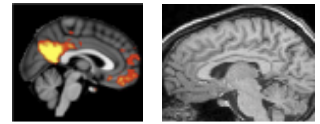Berkeley Aging Cohort Study (BACS)
Healthy people age 20 to 28 or 70 and older are invited to participate in a study to investigate how thinking abilities relate to the brain over time. We are also investigating how the brains of these healthy people differ from those who have Alzheimer's disease or other dementias.
Phone: 510-643-6609
Email: jagustlab.berkeley@gmail.com
Website: jagustlab.neuro.berkeley.edu
Mailing Address:
Jagust Laboratory
Helen Wills Neuroscience Institute
132 Barker Hall MC #3190
Berkeley, CA 94720
WHAT IS BACS?
The purpose of the Berkeley Aging Cohort Study, otherwise known as BACS, is to investigate brain changes that occur in normal aging using neuropsychological assessment and brain scans such as MRI and PET.
This project gathers basic medical information about healthy participants through an interview as well as cognitive tests of memory and other abilities. Participants will be invited back at one- or two-year intervals to repeat this set of tests. By repeating this testing over time, this study may improve our understanding of aging and the ability to diagnose and treat future patients.
WHAT DO I NEED TO KNOW BEFORE SIGNING UP?
These studies will not result in any medical benefit. People who are not presently in good health, who have any history of neurological or psychiatric problems, or who cannot speak English proficiently should not volunteer for the study.
When you call to volunteer for this study, a research associate will ask you a series of questions to determine your eligibility.
A consent form and the Medical Research Subject's Bill of Rights will be given to you to read and sign on the day of the study. You will be given a verbal explanation of the protocol procedure and possible discomforts.
You will come to the University of California, Berkeley, where you will have a brief medical interview. Following this, you will take a series of tests designed to assess your thinking abilities. These tests use pencil and paper or computers and will take approximately three to four hours to complete.
We will place your name on a list and, depending on your age and other factors, we may contact you every one to two years to invite you back for retesting. We will also call you periodically to see if you are interested in participating in other studies of brain aging that are being conducted in a number of laboratories at UC Berkeley, Lawrence Berkeley National Laboratory, and the University of California, San Francisco.
You will be paid $75 for taking the cognitive tests. You may also be paid for participating in other experiments, depending on the ones you select.
WHAT STUDIES ARE ASSOCIATED WITH BACS?
If you join BACS, you will be asked to participate in other studies on how the brain changes with age. These other studies may change over time, but here are some examples of the types of other studies you may be invited to join:
Brain Scanning with MRI
MRI can be used to examine the structure of the brain and its function (functional MRI, or fMRI) using a strong magnet. These scans allow us to see if there is shrinkage of the brain with time as well as how the brain becomes active as you are performing cognitive tasks.
Brain Scanning with PET
These studies use experimental radioactive tracers to measure a variety of different processes. Some examine changes in neurotransmitters like dopamine. Other scans look for abnormal accumulations of proteins like amyloid and tau.
Sleep Studies
There is evidence that sleep disturbances may have negative effects on memory function, especially in older adults. These studies involve recording brain electrical activity using electroencephalogram (EEG) during sleep.
Genetic Testing
Some of our studies involve taking samples to test DNA for normal variations that might be related to how your brain functions or how it changes over time.
Some of these additional studies are very simple and require only one visit for testing, and others are more complex and might require multiple visits. From time to time you may be asked to participate in one of these studies, depending on our need for participants and your eligibility. At that time, you will be given a consent form and time to ask questions if you are interested.


